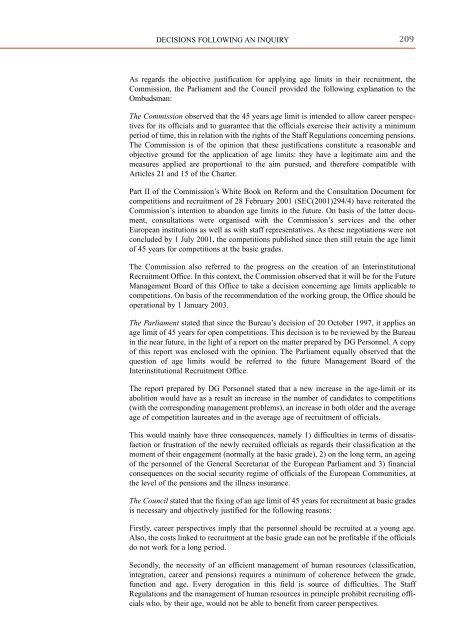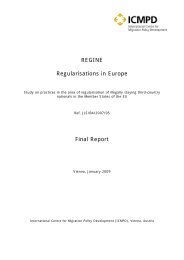Annual report 2002 - EOI
Annual report 2002 - EOI
Annual report 2002 - EOI
You also want an ePaper? Increase the reach of your titles
YUMPU automatically turns print PDFs into web optimized ePapers that Google loves.
DECISIONS FOLLOWING AN INQUIRY 209<br />
As regards the objective justification for applying age limits in their recruitment, the<br />
Commission, the Parliament and the Council provided the following explanation to the<br />
Ombudsman:<br />
The Commission observed that the 45 years age limit is intended to allow career perspectives<br />
for its officials and to guarantee that the officials exercise their activity a minimum<br />
period of time, this in relation with the rights of the Staff Regulations concerning pensions.<br />
The Commission is of the opinion that these justifications constitute a reasonable and<br />
objective ground for the application of age limits: they have a legitimate aim and the<br />
measures applied are proportional to the aim pursued, and therefore compatible with<br />
Articles 21 and 15 of the Charter.<br />
Part II of the Commission’s White Book on Reform and the Consultation Document for<br />
competitions and recruitment of 28 February 2001 (SEC(2001)294/4) have reiterated the<br />
Commission’s intention to abandon age limits in the future. On basis of the latter document,<br />
consultations were organised with the Commission’s services and the other<br />
European institutions as well as with staff representatives. As these negotiations were not<br />
concluded by 1 July 2001, the competitions published since then still retain the age limit<br />
of 45 years for competitions at the basic grades.<br />
The Commission also referred to the progress on the creation of an Interinstitutional<br />
Recruitment Office. In this context, the Commission observed that it will be for the Future<br />
Management Board of this Office to take a decision concerning age limits applicable to<br />
competitions. On basis of the recommendation of the working group, the Office should be<br />
operational by 1 January 2003.<br />
The Parliament stated that since the Bureau’s decision of 20 October 1997, it applies an<br />
age limit of 45 years for open competitions. This decision is to be reviewed by the Bureau<br />
in the near future, in the light of a <strong>report</strong> on the matter prepared by DG Personnel. A copy<br />
of this <strong>report</strong> was enclosed with the opinion. The Parliament equally observed that the<br />
question of age limits would be referred to the future Management Board of the<br />
Interinstitutional Recruitment Office.<br />
The <strong>report</strong> prepared by DG Personnel stated that a new increase in the age-limit or its<br />
abolition would have as a result an increase in the number of candidates to competitions<br />
(with the corresponding management problems), an increase in both older and the average<br />
age of competition laureates and in the average age of recruitment of officials.<br />
This would mainly have three consequences, namely 1) difficulties in terms of dissatisfaction<br />
or frustration of the newly recruited officials as regards their classification at the<br />
moment of their engagement (normally at the basic grade), 2) on the long term, an ageing<br />
of the personnel of the General Secretariat of the European Parliament and 3) financial<br />
consequences on the social security regime of officials of the European Communities, at<br />
the level of the pensions and the illness insurance.<br />
The Council stated that the fixing of an age limit of 45 years for recruitment at basic grades<br />
is necessary and objectively justified for the following reasons:<br />
Firstly, career perspectives imply that the personnel should be recruited at a young age.<br />
Also, the costs linked to recruitment at the basic grade can not be profitable if the officials<br />
do not work for a long period.<br />
Secondly, the necessity of an efficient management of human resources (classification,<br />
integration, career and pensions) requires a minimum of coherence between the grade,<br />
function and age. Every derogation in this field is source of difficulties. The Staff<br />
Regulations and the management of human resources in principle prohibit recruiting officials<br />
who, by their age, would not be able to benefit from career perspectives.
















